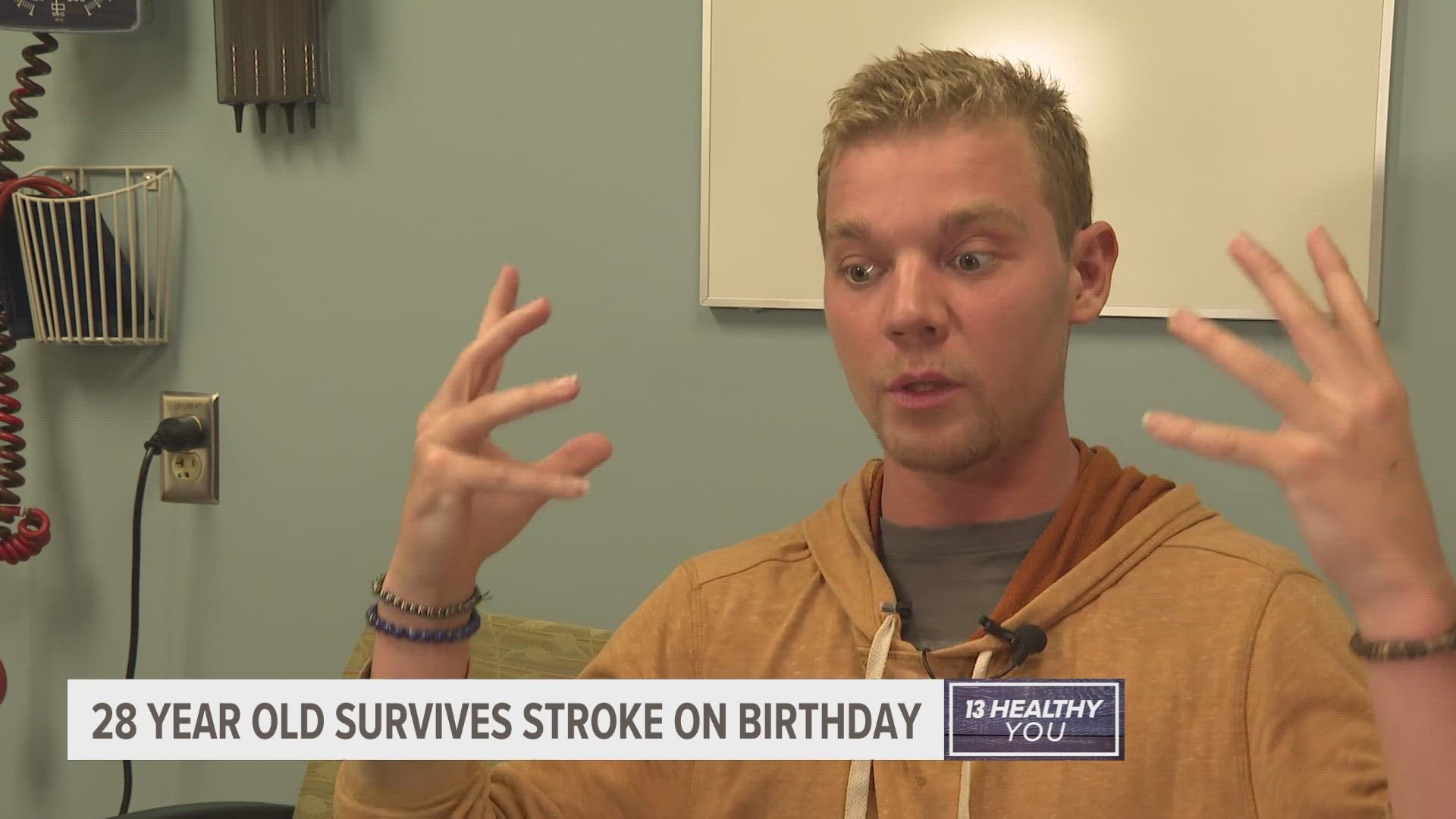GRAND RAPIDS, Michigan — On the morning of his 28th birthday, Adam Lacki slept in and prepared to go to the gym. He began to feel lightheaded and dizzy.
"After about three, four minutes of walking my apartment and gathering my stuff, my backpack and my water, the symptoms, they felt worse, and more dramatic," said Lacki. "As I started to talk to myself, I started slurring my words."
He was drooling, couldn't move his right side and had trouble thinking. He called his doctor, who told him he thought he was having a stroke. Lacki hung up and called 911.
"Those 10 minutes on the phone were the scariest 10 minutes of my life," said Lacki. "My whole body is freaking out on me and it feels like my whole system is just shutting down."
Paramedics arrived and told him his heart rate was 200 beats per minute.
"And the paramedics had sort of a scared look in their eyes," said Lacki.
Once arriving at Corewell Health, he had an MRI that revealed a blood clot in the right side of his brain. He went into brain surgery while awake.
"I could feel sort of something like a squishy sound in my brain," said Lacki. "And I was like, I think they got it. That was weird."
His doctor, Justin Singer, the director of vascular neurosurgery at Corewell Health, said he remembered wishing Lacki a happy birthday shortly after.


"The cause of his problem was most likely a heart arrhythmia, which allowed a blood clot to develop in his heart," said Singer. "That blood clot went undetected, because he was perfectly fine living his normal life, and then that clot got dislodged into his brain and blocked the main artery in the right side of his brain."
Lacki said it was "a nice birthday present," sarcastically.
He had another mini stroke the next day and a heart procedure, but eventually was able to recover at home.
This comes as Corewell Health was recently announced the first Center of Excellence by the National Blood Clot Alliance (NBCA). The hospital in Grand Rapids was recognized for its clinical outcomes and post-hospitalization care for patients with deep vein thrombosis and pulmonary embolism.
"I think it paints a little bit of a bigger picture of one of the system's missions, which is to truly be exceptional," said Singer.
Meanwhile, Lacki said prior to his stroke, he ate healthy, exercised often, didn't drink alcohol and generally took care of himself. He is now working to regain strength and full brain function. However, he said he still has some brain fatigue, exhaustion and trouble with balance.
"You got to treat your health seriously," said Lacki. "I mean, they're called vital organs for a reason, your heart and your brain. Those are two vital organs of your body that you can't take for granted at any time of day."
Dr. Singer said Lacki calling 911 so quickly was vital to his survival.
"Adam, who's 28 years old, which is not like the most common age where we see strokes," said Singer. "They really can impact anybody."
Know the signs of a stroke.
The acronym F.A.S.T can help spot one.
F = Face Drooping. One side of the face may droop or feel numb. Smile may be uneven.
A = Arm Weakness. One arm may be weak or feel numb. One arm may drift downward when raised.
S = Speech Difficulty. Speech may be slurred.
T = Time to call 911. If a stroke is suspected, calling first responders is vital. Every minute counts.
RELATED VIDEO: Grand Rapids hospital first in Midwest to use new procedure to treat AFib
►Make it easy to keep up to date with more stories like this. Download the 13 ON YOUR SIDE app now.
Have a news tip? Email news@13onyourside.com, visit our Facebook page or Twitter. Subscribe to our YouTube channel.

